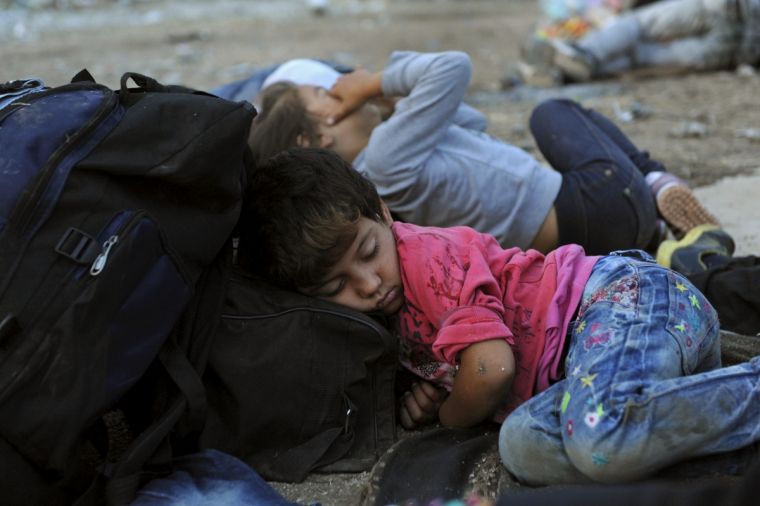The UK has a proud history of taking in refugees. It must do more now

My family knows what it means to be refugees. Some of them came to the UK in 1980 from Iran, while other relatives who happened to be studying in the UK during the Iranian Revolution weren't able to return to their homeland for nearly a decade.
The journey to sanctuary from the Middle East to European shores hasn't changed much in 30 years, it seems. Growing up, I heard stories of my family taking long and uncertain journeys through northwest Iran, across Turkey, and into Europe. In order to survive, they relied on the kindness of strangers and the shrapnel that my grandparents had managed to stuff into their pockets before they bundled them into the boot of a car and out of Tehran.
They didn't know if they would see my grandparents, or their country, again.
Having heard these stories, it is hard to put into words how it felt to arrive on the Greek island of Samos a few weeks ago. Arriving by road at a camp, now a temporary home to thousands of refugees, there isn't much sign that anything is out of the ordinary.
Samos looks like any other Greek island. Green and lush, and surrounded by the blue waters of the Aegean, it evokes the feeling of being on holiday, of enjoying good food and time with family. It is only when you look into the distance to Turkey – a mile away – that you are reminded of what these islands have come to represent.
Christian Aid's partner Apostoli – an agency firmly rooted in the Greek Orthodox Church and supported by International Orthodox Christian Charities – has been working with refugees who have been arriving in Samos for many months.
With borders across Europe now closed, more than 56,000 refugees are effectively stranded in Greece. Unable to move forward, they find themselves living in overcrowded camps with little or no access to education and healthcare, and without adequate provision of legal services to support them in their applications for asylum.
Most refugees still hope to travel to Germany and struggle to understand why they are being detained in a camp, having fled from countries where conflicts seem ceaseless, and where hopes of a peaceful life have all but been extinguished.
One young Syrian man I spoke to voiced his frustration. Pointing at the rows of tents erected behind toilet blocks with poor sanitation, he shook his head. "This isn't Europe," he told me. His family fled to Syria from Palestine as refugees more than 65 years ago. Now they find themselves displaced again, and with their identification documents stolen from the camp, the authorities are struggling to know how to classify his family.
The majority of people I met in Samos were travelling with their families, but there were a considerable number of unaccompanied children, mainly young boys, who have made the journey to Greece alone. According to the UN, unaccompanied children now account for a third of all refugees who make the crossing from Turkey to Greece. That's why the work of our partner, the Greek Council for Refugees, to provide legal protection to children living alone is so important.
On the Greek mainland I met two young Syrian boys who, supported by the Orthodox Church, were due to be relocated to Spain. They told me about the daily terror of living in their hometown of Homs. As well as the incessant threat of bombs, the fear of being forcibly conscripted had become unbearable for them. Reckoning that their luck was about to run out, they had made the difficult decision to leave Syria.
Despite their heartache, I was struck by their resilience and hopefulness, by their love of education, and their desire to make something of themselves in spite of all they had been through. "I cannot wait to learn and to work," Jorg told me. "Have you been to Spain? I hear it is good there."
As I left Greece, I found myself reflecting on the lives of the people I had met: the suspension of people's hopes and dreams as they live in limbo in Greece without a political end in sight to a crisis that is wreaking havoc with their lives. I thought too of Jorg, and how quickly hope can be restored and dreams reimagined when a bright future appears possible.
Greece has a long history of absorbing refugees and migrants. But now, at a time when the country is experiencing its own economic crisis and having seen first-hand how overwhelming the humanitarian situation is, I can't help but feel Greece has been abandoned, and left to cope alone.
The UK has a proud history of offering refuge to people who need it: people like my own family. For the thousands of refugees in Greece, they deserve far, far better than what I saw.
Sian Rowbotham is senior emergency programme officer for the European refugee crisis at Christian Aid, which is calling on the UK government to take a fair and proportionate share of refugees, and to provide safe and legal routes for refugees to travel to, and through, Europe.











